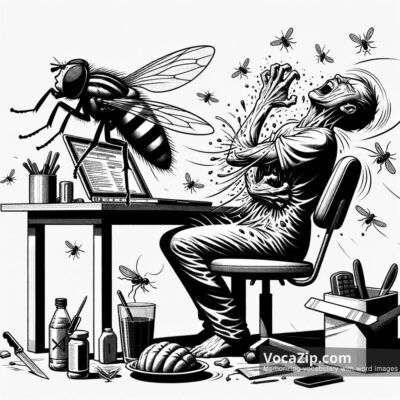irritate meaning
irritate :
annoy, bother
Verb
▪ The loud noise irritates me.
▪ The loud noise annoys me.
▪ His constant talking irritates everyone.
▪ His constant talking annoys everyone.
paraphrasing
▪ annoy – irritate
▪ bother – irritate
▪ perturb – irritate
▪ tease – irritate

Pronunciation
irritate [ˈɪr.ɪ.teɪt]
The stress is on the first syllable 'ir' and sounds like 'IR-ih-teyt'.
Common phrases and grammar about irritate
irritate - Common meaning
Verb
annoy, bother
Part of Speech Changes for "irritate"
▪ irritation (noun) – annoyance or frustration
▪ irritable (adjective) – easily annoyed
▪ irritated (adjective) – feeling annoyed
▪ irritably (adverb) – in an easily annoyed way
Common Expressions with "irritate"
▪ irritate someone – make someone annoyed
▪ be irritated by something – be annoyed by something
▪ irritate the public – annoy the public
▪ easily irritate – become annoyed easily
Important examples of irritate in TOEIC
Vocabulary examples from the TOEIC test
In TOEIC vocabulary questions, irritate is often used to describe actions that cause annoyance or discomfort.
Example of a confusing word: agitate (to disturb or stir up)
Grammar examples from the TOEIC test
Irritate is typically used as a transitive verb, requiring an object in TOEIC grammar questions.
irritate
Idioms and fixed expressions in TOEIC
environmental irritants
factors that cause annoyance, used in TOEIC Part 7 passages.
rub someone the wrong way
means to irritate someone, used in informal TOEIC passages.
Differences between similar words and irritate
irritate
,
annoy
differences
irritate is used to make someone feel annoyed or bothered, often by repeated actions, while annoy can refer to a broader range of irritating behaviors.
irritate
,
bother
differences
irritate specifically refers to causing annoyance, often through repeated or sustained actions, while bother can also imply minor inconvenience or disturbance.
Words with the same origin as irritate
The origin of irritate
The word 'irritate' comes from the Latin 'irritare', which means 'to excite' or 'to provoke'.
Word structure
The analysis of the word's composition is unclear.
Words with the same origin
The word's root is 'irrit', but it is unclear or difficult to confirm influential words with the same root.
Please select an image in the quiz
Previous post and next post







